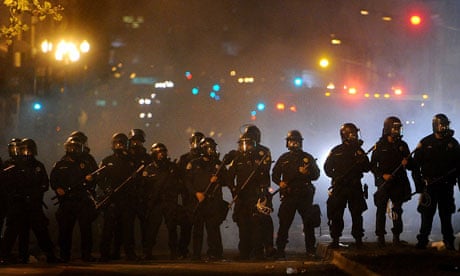It was more sophisticated than we had imagined: new documents show
that the violent crackdown on Occupy last fall – so mystifying at the
time – was not just coordinated at the level of the
FBI,
the Department of Homeland Security, and local police. The crackdown,
which involved, as you may recall, violent arrests, group disruption,
canister missiles to the skulls of protesters, people held in handcuffs
so tight they were injured, people held in bondage till they were forced
to wet or soil themselves –was coordinated with the big banks
themselves.
The Partnership for Civil Justice Fund, in a groundbreaking scoop
that should once more shame major US media outlets (why are nonprofits
now some of the only entities in America left breaking major civil
liberties news?), filed this request. The document –
reproduced here in an easily searchable format
– shows a terrifying network of coordinated DHS, FBI, police, regional
fusion center, and private-sector activity so completely merged into one
another that the monstrous whole is, in fact, one entity: in some
cases, bearing a single name, the Domestic Security Alliance Council.
And it reveals this merged entity to have one centrally planned, locally
executed mission. The documents, in short, show the cops and DHS
working for and with banks to target, arrest, and politically disable
peaceful American citizens.
The documents, released after long delay in the week between
Christmas and New Year, show a nationwide meta-plot unfolding in city
after city in an Orwellian world: six American universities are sites
where campus police funneled information about students involved with
OWS to the FBI, with the administrations' knowledge (p51); banks sat
down with FBI officials to pool information about OWS protesters
harvested by private security; plans to crush Occupy events, planned for
a month down the road, were made by the FBI – and offered to the
representatives of the same organizations that the protests would
target; and even threats of the assassination of OWS leaders by sniper
fire – by whom? Where? – now remain redacted and undisclosed to those
American citizens in danger, contrary to standard FBI practice to inform
the person concerned when there is a threat against a political leader
(p61).
As
Mara Verheyden-Hilliard, executive director of the PCJF,
put it, the documents show that from the start, the FBI – though it
acknowledges Occupy movement as being, in fact, a peaceful organization –
nonetheless designated OWS repeatedly as a "terrorist threat":
"FBI documents just obtained by the Partnership for Civil Justice
Fund (PCJF) … reveal that from its inception, the FBI treated the Occupy movement
as a potential criminal and terrorist threat … The PCJF has obtained
heavily redacted documents showing that FBI offices and agents around
the country were in high gear conducting surveillance against the
movement even as early as August 2011, a month prior to the
establishment of the OWS encampment in Zuccotti Park and other Occupy
actions around the country."
Verheyden-Hilliard
points
out the close partnering of banks, the New York Stock Exchange and at
least one local Federal Reserve with the FBI and DHS, and calls it
"police-statism":
"This production [of documents], which we believe is just the tip of
the iceberg, is a window into the nationwide scope of the FBI's
surveillance, monitoring, and reporting on peaceful protestors
organizing with the Occupy movement … These documents also show these
federal agencies functioning as a de facto intelligence arm of Wall
Street and Corporate America."
The documents show stunning range: in Denver, Colorado, that branch
of the FBI and a "Bank Fraud Working Group" met in November 2011 –
during the Occupy protests – to surveil the group. The Federal Reserve
of Richmond, Virginia had its own private security surveilling Occupy
Tampa and Tampa Veterans for Peace and passing privately-collected
information on activists
back to the Richmond FBI, which, in
turn, categorized OWS activities under its "domestic terrorism" unit.
The Anchorage, Alaska "terrorism task force" was watching Occupy
Anchorage. The Jackson, Mississippi "joint terrorism task force" was
issuing a "counterterrorism preparedness alert" about the ill-organized
grandmas and college sophomores in Occupy there. Also in Jackson,
Mississippi, the FBI and the "Bank Security Group" – multiple private
banks – met to discuss the reaction to "National Bad Bank Sit-in Day"
(the response was violent, as you may recall). The Virginia FBI sent
that state's Occupy members' details to the Virginia terrorism fusion
center. The Memphis FBI tracked OWS under its "joint terrorism task
force" aegis, too. And so on, for over 100 pages.
Jason Leopold, at Truthout.org,
who has sought similar documents for more than a year, reported that
the FBI falsely asserted in response to his own FOIA requests that no
documents related to its infiltration of Occupy Wall Street existed at
all. But the release may be strategic: if you are an Occupy activist and
see how your information is being sent to terrorism task forces and
fusion centers, not to mention the "longterm plans" of some redacted
group to shoot you, this document is quite the deterrent.
There is a new twist: the merger of the private sector, DHS and the
FBI means that any of us can become WikiLeaks, a point that Julian
Assange was trying to make in explaining the argument behind his recent
book. The fusion of the tracking of money and the suppression of dissent
means that a huge area of vulnerability in civil society – people's
income streams and financial records – is now firmly in the hands of the
banks, which are, in turn, now in the business of tracking your
dissent.
Remember that only 10% of the money donated to WikiLeaks can be
processed – because of financial sector and DHS-sponsored targeting of
PayPal data. With this merger, that crushing of one's personal or
business financial freedom can happen to any of us. How messy,
criminalizing and prosecuting dissent. How simple, by contrast, just to
label an entity a "terrorist organization" and choke off, disrupt or
indict its sources of financing.
Why the huge push for counterterrorism "fusion centers", the DHS
militarizing of police departments, and so on? It was never really about
"the terrorists". It was not even about civil unrest. It was always
about this moment, when vast crimes might be uncovered by citizens – it
was always, that is to say, meant to be about you.
• This article originally referred to a
joint terrorism task force in Jackson, Michigan. This was amended to
Jackson, Mississippi at 4pm ET on 2 January 2012




